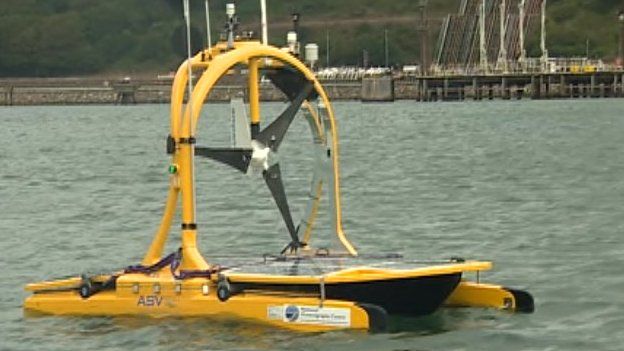Controlled by scientists in Southampton and Portsmouth, a pair of robots will navigate and explore ocean life off of the Pembrokeshire coast in Welsh for one month, a project that will pave the way for a new era in marine research and represents a new partnership between the National Oceanography Centre and charity World Wildlife Fund (WWF).
Each robot vehicle will be equipped with sensors that are capable of measuring the temperature and salinity of the water, acoustic ‘pingers’ to detect plankton and fish shoals, acoustic monitors to detect clicks and whistles from mammals, and GoPro cameras to capture images of marine life.
C-Enduro, an unmanned surface vehicle (USV) powered by wind and solar energy and controlled remotely by satellite, known as 'Thomas’, set for voyage Thursday, August 20, 2105 from Milford Haven. Thomas will work with an underwater Slocum Glider, moving up and down in the water, and will explore an area South West of the Welsh coast known as the 'Celtic Deep', approximately 50 miles offshore.

The glider was flown from Royal Research Ship Discovery on August 10, 2015 to meet Thomas at a point off the Welsh coast, and the pair is scheduled to return to the National Oceanography Centre in one month with photos and data.
Known as a hotspot for marine animals, including dolphins, harbor porpoises, and the world's second biggest animal, the fin whale, the data gathered in the ‘Celtic Deep’ from Thomas could help inform the Welsh and UK Government processes for protecting the unique region.
“As well as being home to a wonderful array of animals and plants, our seas provide vital resources such as food and energy, but our oceans are under increasing pressure and are in need of greater protection. By using innovative technology like these vehicles, we can learn more about the life that is offshore and out of our sight and make sure these areas are given the protection that they need,” Dr Lyndsey Dodds, Head of Marine Policy at WWF, said.
A lack of data on marine behavior can present problems for policy makers involved in conservation and management, but these robots help present a cost-effective method for gathering information.
Source: BBC
Advertisement
Learn more about Electronic Products Magazine





